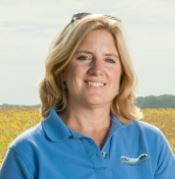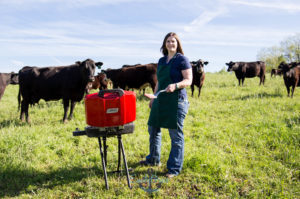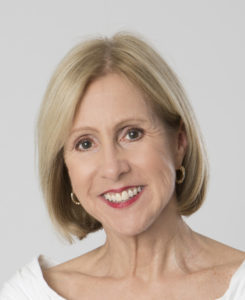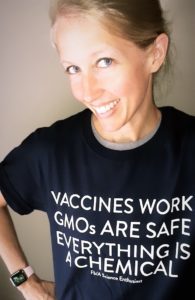Michele Payn's Blog, page 8
March 12, 2020
Where food grows, bugs go: Episode 31
Wine. Tomatoes. Green beans. Tofu. What may sound like a menu is actually what this Maryland farmer grows. Jennie Schmidt shares why her farm transitioned from organic to conventional to be more sustainable, how she produces such a wide variety of crops, and what food bullying terms like factory farming mean to her family farm.
Jennie is a dietitian turned farmer, so she’s a great #featuredfarmer during National Nutrition Month & National Agriculture Month. She grows corn for chickens, soybeans for tofu and oleic oil, grapes for wine, tomatoes for a canning company, green beans for the fresh market and other crops on their farm in Maryland. Jennie gives great insight on why she uses chemicals on all of her products, the positive environmental impact she works toward, and how some of the products can be a pain in the butt to grow and even smell really bad. Listen in to go inside a ‘grocery store’ farm.
Key points
Wine, grapes, and chemicals. The technology and intensive hand labor involved in a vineyard.
How weeds are a pest in a farm field and what farmers do about them.
The transition away from organic farming to conventional – and why .
How weeds take moisture and nutrients from crops.
How farmers protect topsoil, the value of tillage, and farming in the unique Chesapeake Bay environment.
The trade-off of diesel fuel, man hours and equipment versus the use of herbicides.
Why tillage is used in some areas, but not in others. There’s no singular right way to farm.
How 3.5 million pounds of tomatoes are harvested and why they can stink
Tips to overcome food bullying: don’t be afraid of your food
Family farms, factory farms, and misperceptions.
 Fabulous quotes
Fabulous quotes
“Chemicals naturally occur in all foods. And you and me “
“Where foods grows, bugs go.”
“When you plow your field, you’re burying the organic matter you’ve built up from the previous year.”
“There are different types of farming practices that work for different parts of the country that work for different crops.”
“There’s no cookie cutter system – no one system works perfectly across all growing regions.”
Links
Twitter @farmgirlJen
Facebook: The Foodie Farmer
Food Bullying: How to Avoid Buying BS by Michele Payn
Embrace Your Heart with Eliz Greene
Food Bullying Podcast’s Facebook page
March 10, 2020
Are you bullying yourself about food? Episode 30
“I shouldn’t eat this…I’m too fat to have this cupcake…I’m not a good parent because I bought this snack.” When was the last time you judged or criticized yourself about food? National Nutrition Month is a great time to change the restrictive mentality we have around food and today’s guest will help you spend less energy worrying about food.
Cara Harbstreet is a Registered Dietitian Nutrition (RDN), focused on eating without restriction or fear. She’s authored an intuitive eating workbook to help people find food freedom and celebrate eating agin. ara believes health at every size is pursuing healthful behaviors that can help us. Stop bullying yourself about food and buying into the chaotic eating space. If all else fails, celebrate with chocolate and smile!
Key points
Food shame: why we bully ourselves
Food freedom: how do you relate to food and believe what your believe? It’s a very fluid and ongoing process.
Health at every size: moving away from calories in and calories out, putting more of an individual emphasis on other factors.
Food bullying offers a persona to restrictive mentality, which can lead to eating disorders.
How you’re drawn in by “bright and shiny” objects of food labels
Standards: put some blinders on and identify your own priorities, which can be determined by budged, time, and other preferences.
The stress of trying to feed ourselves and making nutrition decisions, from calorie counting, macros, etc.
Being more compassionate towards yourself; adapt and evolve your plans to what happens in the moment to be more flexible in getting through the day.
The multi-billion business of dieting and supplements.
Pendulum effect of restrictive eating and the associated cycle. Find a place you can sustain new found satisfaction around food.
How restricting your food can lead to overeating.
Identifying B.S. label claims such as super foods, detox foods, transparent food.
The importance of transparent conversations with farmers and farmers to help people feel more comfortable with food production
Tips to overcome food bullying: Take a step back to check-in with yourself, stay curious and skeptical, and grow your network.
 Fabulous quotes
Fabulous quotes
“Shame is the most powerful master emotion. It’s the fear that we’re not good enough.” says Brene Brown. Food should never be about shame.”
“Don’t let one negative experience about food define your story.”
“Health at every size means we’re pursuing the helpful behaviors.”
“If we feel that our food choices don’t uphold this ideal standard of how we “should” be eating, there is a harsh cycle of criticism and judgment, often from ourselves.”
“Get more in tune of what’s going to look best for you in the long run.”
“Eating is such a fun thing, but food can be incredibly stressful instead of celebration and connecting with other people. It can be contentious.”
“We really don’t have to be so uptight and need to loosen up about food.”
“Food is deeply, deeply personal.”
Links
Instagram, Twitter, Facebook: @streetsmartrd
Website: www.streetsmartnutrition.com
Food Bullying: How to Avoid Buying BS by Michele Payn
Embrace Your Heart with Eliz Greene
Food Bullying Podcast’s Facebook page
March 5, 2020
How now, brown cow? Why a dairy farmer talks to his cows: Episode 29
Are dairy farmers crazy? Maybe, but it’s because they always put their cows first. It’s National Agriculture Month and we are bringing you a featured farmer (#featuredfarmer) each week. Derrick Josi, an Oregon dairy farmer and founder of TDF Honest Farming, encourages farmers to bridge the gap with consumers – and understand the divide goes both ways.
He talks about his little brown cows, while Michele jokingly accuses him of being a cow racist, and they discuss beautiful udders while Eliz cringes. Derrick shares the mental health impact of bullying by activists, how he actually cares for cows, and the work that goes into producing healthy milk.
Key points
Putting animal welfare and farming documentaries in context by understanding the “why” of farming practices.
Generational disconnect between consumers and farmers – the gap works both ways.
Differences in breeds of dairy cattle and personal preferences.
Why do dairy farmers share pictures of cow’s udders?
Why Derrick talks to his cows about hot topics and lets them kiss the camera.
Impacts of food bullying on farmers and the extreme messages sent by anti-dairy activists. It can cause mental issues in farming.
Cows should be in barns – and why.
Staying grounded in spite of online commentary; stop focusing on the minority of people who are not nice and pay attention to the 99% who are nice.
How Derrick handles several hundred private messages/day and personally responds.
Tips to overcoming food bullying: nobody’s business what you are eating, food is extremely safe, and eat what you enjoy – don’t let anyone take away the foods you enjoy.
 Fabulous quotes
Fabulous quotes
“Some people think I’m crazy when I’m out there lecturing my cows.”
“These animals do not fear me, they trust me, and they are definitely not abused.”
“Food bullying is when someone tries to force their lifestyle on others. I see it happening more and more online.”
“These people (activists) roam the internet in a herd. It is mentally exhausting and you have to step away to take a break.”
“I wish people understood how much time it takes out of my day to do what I do online.”
“I wish they understood the cow comes first. The cattle are our livelihood. Everything evolves around taking care of the cows 24 hours/day, 7 days/week. I am always on call.”
“You kind of have to be crazy to be a dairy farmer.”
Links
Twitter: @DerrickJosi
Instagram, Facebook, YouTube: @TDF Honest Farming
Embrace Your Heart with Eliz Greene
Food Bullying: How to Avoid Buying BS by Michele Payn
Pssst…have you liked the podcast’s page on Facebook?
March 3, 2020
Are your hands a food safety risk? Episode 28
Did you know that only 8% of males wash their hands after using the restroom? And those hands may have picked up that apple you just purchased? Hygiene is important – both on your hands and in your kitchen. More important than concerns around chemicals and pesticides when it comes to food safety.
Jennie Hodgen has her doctorate in food science and works as a meat scientist. She’s a mom of four who loves to talk about bacteria, meat cuts, cleaning produce, and keeping your food safe. “The food you’re getting has gone through quite a bit of rigor from a food safety standpoint.” She helps us remember that food safety done well is invisible in the latest episode of the Food Bullying podcast.
Key points
Cross-contamination of food and germs on hands and why it’s more important than concerns around pesticides and chemicals.
Bacteria, viruses and your food.
How to wash your produce – and your hands.
Remember to clean or throw out your scrubber to avoid the transfer of bacteria from one fruit/vegetable to another.
USDA’s recommendation on food safety: clean, separate, cook it properly, refrigerate.
Knives and cutting boards used for cutting meat need to be washed before using them again.
Why does meat have bacteria? Is it good or bad? Are some cuts more exposed?
Use your meat thermometer – not your hands and sanitize.
Keep in mind that meat will continue to cook once it is off the heat.
Chemicals and pesticides are not a food safety concern.
The B.S. of labels such as farm-raised, natural, super food, and whole.
Tips to avoid food bullying: eat what you like, always ponder, don’t play the adjective game.
 Fab quotes
Fab quotes
“Bacteria and viruses are everywhere in the environment.”
“Some food is “closer to nature” and need a little extra scrub, such as pick-your-own.”
“Understand that bacteria is naturally found on meat – and why we cook it. As long as you are using a meat thermometer, you don’t need need to worry about your cooked meat.”
“It is important to use a meat thermometer.”
“Food safety done well is invisible.”
“If you consider the billions of pounds of foods we produce in the U.S., you should feel good about the number of recalls. There is tons of testing going on.”
“You don’t have to play the adjective game. Just because it has more adjectives on the label than anything else, doesn’t mean it’s healthier.”
Links
Twitter: @hodgenstein
Instagram: @jhodgen @beefpros
Have you liked the new Food Bullying Podcast Page on Facebook?
Embrace Your Heart with Eliz Greene
Food Bullying: How to Avoid Buying BS by Michele Payn
February 25, 2020
Are You Eating Beyond the Headlines? Episode 27
Are you leaving foods out of your diet? You can run the risk of creating health issues if you are leaving out a food group, such as carbohydrates. “Our bodies need a variety of nutrients, which are obtained from variety of foods in our diet” points out Neva Cochran, a registered dietitian nutritionist.
When you eliminate most of the foods in your diet, you are not going to be adequately nourished and may not have enough calories. That’s when your body starts breaking down muscle, producing ketones, or other consequences.
Today’s Food Bullying podcast guest advises us to not label foods good or bad, just try to eat all foods in moderation, prepared in ways that don’t add a lot of extra calories.
Key points
Cranberries, sustainability, and fruit floating at harvest.
Excluding entire food groups leads to people missing out on nutrients
Gaining weight back in the yo-yo syndrome and avoiding the quick fix of dieting.
Dietary guidelines released every five years, recommended by experts.
My Plate is great way to eat a balanced diet with appropriate portion sizes.
How to maintain a healthy lifestyle.
Fear-based food marketing and uncontrolled label claims.
It can be more efficient in food miles to get foods from far away rather than solely focus on local.
Many times it’s not what we’re eating, but more about what we are not, such as produce.
Why frozen and canned fruits and vegetables are just as nutritious as fresh, and often less expensive. They are always in season.
Should we be concerned about preservatives or are they a distractor to healthy eating?
People are looking for simple solutions to complex problems.
Food shaming in the grocery store.
How to overcome food bullying: don’t believe everything you hear from your friends or online, turn food package over to look at Nutrition Facts Panel, talk to a Registered Dietitian Nutrition if you have a specific health issue related to food and nutrition.
Fab quotes
“Physical activity is key to taking off and maintaining weight.”
“The combination of eating a balanced diet and physical exercise is critical.”
“People are very attracted to quick weight loss, like cutting out entire food groups, such as carbohydrates. It just doesn’t work and isn’t healthy.”
“The fact is that you cannot tell a food grown with biotechnology in agriculture from one that isn’t. There is no nutritional difference.”
“Our body is very efficient at cleansing out toxins, so people don’t need to worry about cleansing because our bodies do that naturally.”
“90% of the people in the U.S. do not eat enough fruits or vegetables.”
“People get concerned about minutia when they should be focused on eating more fruits and vegetables and whole grains, as well as lean meats, low fat dairy and healthy fats.”
Links
Twitter & Instagram: @nevardld
Neva’s Facebook Page: https://www.facebook.com/NevaRDLD/
Produce for Health Foundation
Have you liked the new Food Bullying Podcast Page on Facebook!
Embrace Your Heart with Eliz Greene
Food Bullying: How to Avoid Buying BS by Michele Payn
February 18, 2020
Oscars and Vegetarians and Starbucks, OH MY! Episode 26
Artificial insemination. Vegetarian choices. The Oscars. STDs. Greenhouse gas emissions. Baby calves. Nursing. Starbucks. Nutrient density of food. Personal choices.
If those topics don’t add up to a civil conversation in your mind, listen in for a model on how to have a discussion around food and the environment that’s respectful and informative with someone different than you. Yes, you can still laugh together. College student and vegetarian Grace Greene- and Eliz’s daughter – joins the Food Bullying podcast to ask questions Joaquin Phoenix’s comments about dairy cattle and Starbucks new plant-based “strategy”, while sharing her journey as a vegetarian. It’s Michele & Eliz’s candid, monthly behind-the-scenes look at how food bullying hurt a variety of people.
Key points
A vegetarian’s perspective on Joaquin Phoenix’s offensive Oscar remarks
Farmer suicide rates are double the national average and have jumped 34% in six years. How do brand and celebrity statements about farming practices contribute?
Farmers connection to the natural world and care for animals
Artificial insemination is done for a purpose, it’s a medical procedure
Reproductive physiology in cattle and humans
Why bulls can hurt cattle, people and biosecurity
Unhappy cows do not make milk
Why do dairy farmers “take babies away from their mamas”? Safety and nutrition are critical for both the cow and calf.
The environmental impact of food choices for both vegetarians and carnivores
Why Grace became a vegetarian and the connection she was seeking
Greenhouse gas emissions and how farmers have significantly reduced the environmental impact for one gallon of milk
The unintentional negative consequences of statements from companies and celebrities on farmers
Nutrient Density to Climate Impact (NDCI) index and the importance of considering the nutrition in food while looking at environmental impact
 Fab quotes
Fab quotes
“Humans are the direct beneficiary of reproductive research done in cattle.”
“It’s important to arm ourselves with reliable science to make smart choices.”
“Electricity production accounts for 26% of greenhouse gas emissions in the U.S.”
“If every American eliminated ALL animal protein, it would only reduce greenhouse gas emissions by 2.6%.”
“Across the entire world, 70% of the world’s land can’t be used for anything besides grazing ruminants. There is not an option to grow crops on that land.”
“We all need to be aware of where our food is coming from and how to be environmentally conscientious.”
“The unintended consequences of sensational statements by celebrities and brands turns people away from milk, which hurts dairy farmers. It’s deeply personal and does impact that mental health of farmers.”
Links
Like the new Food Bullying Podcast Page on Facebook!
Twitter: @mpaynspeaker @elizgreene
Starbucks, are you contributing to farmer suicides?
Embrace Your Heart with Eliz Greene
Food Bullying: How to Avoid Buying BS by Michele Payn
February 11, 2020
Are chemicals in food poisoning you? Episode 25
“Don’t eat what you can’t pronounce… Synthetic chemicals are more dangerous than natural chemicals… Chemicals in food are killing us… There is no safe level of pesticides…”
It’s no wonder we are scared of food with myths like these flying around our plates. Today’s Food Bullying podcast guest not only knows and loves chemicals, she can help you understand why it’s O.K. that your food is filled with them.
Erin, widely known as Food Science Babe, is a chemical engineer and a food scientist. She’s also a mom of a special needs toddler , and was once an organic consumer who believed in the Dirty Dozen list, but now buys conventional food with as few labels claims as possible. Erin found the science didn’t support the marketing claims and now works daily to overcome fear in the science of food. As such, she faces the bullies every day.
Key points
The difference between a food scientist and a dietitian?
Should you eat food with ingredients you can’t pronounce?
How does a chemical engineer end up in food science?
Working on new food products is so interesting, but many of them don’t ever make it to market. Food scientists can work on new products for six months to a year.
Chemicals in food and misperceptions around natural chemicals being better than synthetic chemicals.
There are many regulations around ingredients in food, food scientists and companies aren’t just allowed to put whatever they want – the type and amount are closely regulated.
Natural, organic, non-GMO and other fear-based marketing labels on food and what they mean to you.
Organic does have a set of processing standards, but many consumers have misperceptions that organic is healthier and don’t use pesticides, which is false.
Use safefruitsandveggies.com to better understand if food can hurt you and learn more chemical tolerance and residue.
How & why Erin decided to not buy organic products. Learning more about arbitrary the non-GMO food and that marketing claims did not translate into healthier or safer foods.
Three tips: recognize food bullying exists, understand basic science concepts, follow accounts to help you better understand e.g. farmers.
 Fab quotes
Fab quotes
“Whether you can pronounce an ingredient or not has no bearing on whether it’s safe. If you can’t pronounce it, look it up.”
“We have to remember that literally everything in food is chemicals. A natural banana has hundreds of chemicals in it.”
“’The dose makes the poison’ applies to every single chemical.”
“To fear monger over conventional pesticides and say that organic is better because of that, is not true. Our entire food supply is incredibly safe from a pesticide residue perspective.”
“Many people have the misconception that there is no safe level of pesticide. 99.99% of pesticides we consume are produced by the plants themselves.”
“Company conversations around marketing food are not about healthy or safe, but focuses on who is the target market and how much they’re willing to pay.”
Links
Facebook Instagram & Twitter: @foodsciencebabe
safefruitsandveggies.com
Food Bullying: How to Avoid Buying BS by Michele Payn
Embrace your Heart
February 4, 2020
How can eating help you never miss a heart beat? Episode 24
Did you over-indulge during the Super Bowl festivities, Christmas, or the last family holiday? You’re not the only one – holiday heart syndrome and atrial fibrillation (afib) is not uncommon after eating too much. Food can help you proactively manage your health – or it can lead to missed heart beats.
In addition to explaining more about afib, today’s guest talks about figuring out what fuels your body the best and creating your own personal diet. Mellanie True Hills is the CEO and founder of StopAfib.org, a patient advocacy organization to help those living with atrial fibrillation. Their mission is “to rid the world of strokes from afib and to give people living with afib their lives back.”
Key points
What is atrial fibrillation? What does it feel like?
Afib lead to stroke, heart failure and other health issues
Cure to jet lag
How to avoid afib: it can be related to diet, weight, sleep, etc.
Exercise safely for the heart
Holiday heart syndrome: overindulging during super bowl, Christmas, Thanksgiving, etc.
Quest to find information can bring about food bullying when people don’t agree with recommendations or ideas or their pet diet may be less than ideal
Nutrition research is a difficult area to study – there are confounders
Don’t stress out over research that flip flops, food research is going to change
 Fab quotes
Fab quotes
“The heart needs water in order to function properly.”
“Make sure you’re doing all the healthy kinds of behaviors.”
“Sleep is really crucial for your heart health.”
“Competitive athletes have 5x the risk for afib as the rest of the population”
“Holiday heart syndrome can come as a shock when the heart goes out of order. It’s really crucial to get help.”
“Nutrition research is not necessarily held to the same kind of standard as drug and device.”
“Very often doctors don’t know about nutrition; they’re not really in the position to provide help.”
“Figure out what fuels your body the best and create your own personal diet.”
Links
Website: https://stopafib.org/
Facebook Instagram & Twitter: @stopafib
Food Bullying: How to Avoid Buying BS
Embrace your Heart
January 28, 2020
Do you know the pecking order of the egg? Episode 23
A basic nutritional building block. Part of your everyday eating. Used for baking, breakfast and bullies. Wait, what? Eggs – or the hens that produce them and the people who care for those hens – have long been the target of animal rights bullies. But rest assured, there is no big nutritional difference in eggs, and science shows that no single hen housing is superior.
In this episode, Dianne McComb, a Canadian egg enthusiast talks about the life of chickens on her farm in Ontario. She shares how there’s a disconnect between farmers and consumers, hens are in every country in the world, and how hens act toward each other. Chickens don’t always act pretty, but eggs are a safe, reliable source of protein, regardless of the crazy labels on the egg case or package.
Key points
An egg is an egg is an egg.
Ag literacy helps address the disconnect between farmers and consumers
Eggs as a nutritional building block and key source of protein
Hens can lay 340 eggs in a year due to genetics that allow them to convert feed more efficiently, with less feed waste and better health for hen.
Hen housing: North America places hens in cages to get them up off the floor and out of the manure. Eating and drinking space were mandated, birds could be monitored more closely.
Hens are omnivores and will peck at each other. Cages and enriched colonies allow for hens to be moved away from bully birds, free range does not.
Free range has created some challenges with health, cost, and animal welfare.
Cages look cruel to the untrained eye. They are more of a luxury condo.
Activists have an agenda to get rid of animal agriculture. They have bullied farmers and corporations on issues such as cage-free, without consideration of food affordability.
Antibiotics are only used on chickens that are sick – it’s neglectful to not treat the hen and the eggs are not allowed in the food supply.
Egg laying chickens are not given any hormones – it is illegal in both the U.S. and Canada. Hormones in all eggs, just as they are in other foods, naturally. Hormone-free is a marketing term.
Illness spreads very quickly when hens go outside and interact with wild birds who have diseases.
 Fab quotes
Fab quotes
“Eggs are a highly consumed, reliable source of protein in human nutrition.
“The science behind that little hen is just amazing.”
“Hens peck each other to death if not monitored. They also like to peck at their feces.”
“Farmers care for their hens in whatever system they use, whether it’s cages, free-ranged, or enriched.”
“We want you confident that the egg is a safe choice for your family’s nutrition.”
“Farmers care.”
“It is illegal to give hormones to chickens in the U.S. and Canada.”
Links
@DianneMcComb on Facebook & Twitter
Food Bullying: How to Avoid Buying BSby Michele Payn
Embrace your Heart
January 24, 2020
Starbucks, are you contributing to farmer suicides?
Starbucks, I’ve been a long-time fan. I have enjoyed your ambiance during conference calls and even pounded out books on my keyboard while consuming your $5 grande lattes. My caffeine needs are high as a working mom, small business owner, business traveler, and Holstein breeder. You used to be my go-to when I could afford a treat.
Those days are over. You see, I’ve watched thousands in dairy farming suffer – and your announcement this week added to that, in my opinion. The families milking cows in the U.S. have lost money for over five years – and our country saw 3,000 dairy farms go out of business in 2018. My friends, Willis and Carla with their twin children, were one of the 800 farms in Wisconsin that were forced to sell their cows last year because they couldn’t make a living.
 Dairy farmers suffer from false environmental claims
Dairy farmers suffer from false environmental claimsWillis and Carla – and many other friends who have suffered through losing their family business – came to mind when I heard your CEO’s announcement, “We will expand plant-based options, migrating toward a more environmentally friendly menu.” It sounds nice – after all, who doesn’t want to be environmentally friendly?
We should all be doing more, which includes looking at the big picture and taking responsibility for electricity production that’s 28% of U.S. greenhouse gas emissions. Did you know that transportation accounts for more than 7x greenhouse gas emission than methane from livestock? It’s O.K. if this cars vs. cow number surprises you – I’m guessing most people don’t know their personal contribution.
Your “new strategies” may not be a direct attack on dairy. However, it insinuates that animal agriculture is not environmentally friendly. In short, your statement – and those from other brands – lay environmental guilt on those who choose milk and meat. I refer to this as food bullying because it leverages fear and guilt to sell product. Those claims have direct consequences on the families producing food.
In case you’re not aware, farmer suicide rates are double the national average, and jumped 34% in six years. Have you seen the news about farmers taking their lives when they can no longer farm? There are many factors contributing to rural mental health, including weather, trade, and a deep recession in agriculture. You say you support farmers, but perhaps you’re not aware how the continued barrage of questions and references about farmers hurting the environment and their animals add to the mental health problem? Farmers are glad to answer questions, but the attacks from all fronts, including your new shareholders PETA, are taken personally. Because that’s what farming is to us.

My teenaged daughter wants to continue owning cows when she is grown, but I don’t know if she’ll be able to pursue that dream if we can’t find a solution. Interestingly, the cow “Disney” she is training in this photo is seven years old – and in the time of this cow’s life, dairy farmers have reduced water usage nearly 31%, land use 21% and fuel 20%. Disney gives 4,500 pounds more milk annually than her average predecessors and uses less resources to do so. It’s a cool story, one that deserves to be told as much as campaigns like this or #stopsucking.
What’s the solution? First, please consider the unintended consequences of preaching about “a more environmentally friendly menu” because it does hurt family businesses – and the small communities they help support. Secondly, take a look at nutrition as part of the sustainability equation. As scientists who developed the first Nutrient Density to Climate Impact (NDCI) index said “A sustainable diet cannot be formulated based only on one or a few aspects, but requires taking the complexity of many nutrients into consideration.” Their study clearly shows that milk offers more nutritional bang for the hypothetical buck (or $5 latte) – when both nutrition and greenhouse gas emissions are considered.
Just as it takes more than one formula to create a grande latte, sustainability includes multiple ingredients. Sustainability in food production, done well, takes a big picture look at the environment, the ability of family businesses to succeed long-term and contribute to their local communities – AND the nutrition value food brings to society. Expanding plant-based beverages does not necessarily mitigate climate change, but it does have health consequences, in both physical and mental well-being
Won’t you please
consider the nutritional value of your beverages and the unintended consequences
you have handed to family business who are suffering, but believe in a
sustainable future? I support choice, understand some people are lactose
intolerant, have friends who are vegan, and my family eat almonds nearly every
day.
We support choice without insinuating any of those is more superior . Isn’t it possible to sell coffee the same way, and not state that plant-based is more environmentally friendly? Let’s take a look at social good for all, including family farmers. Isn’t that what “inspiring and nurturing the human spirit every day” should include?



